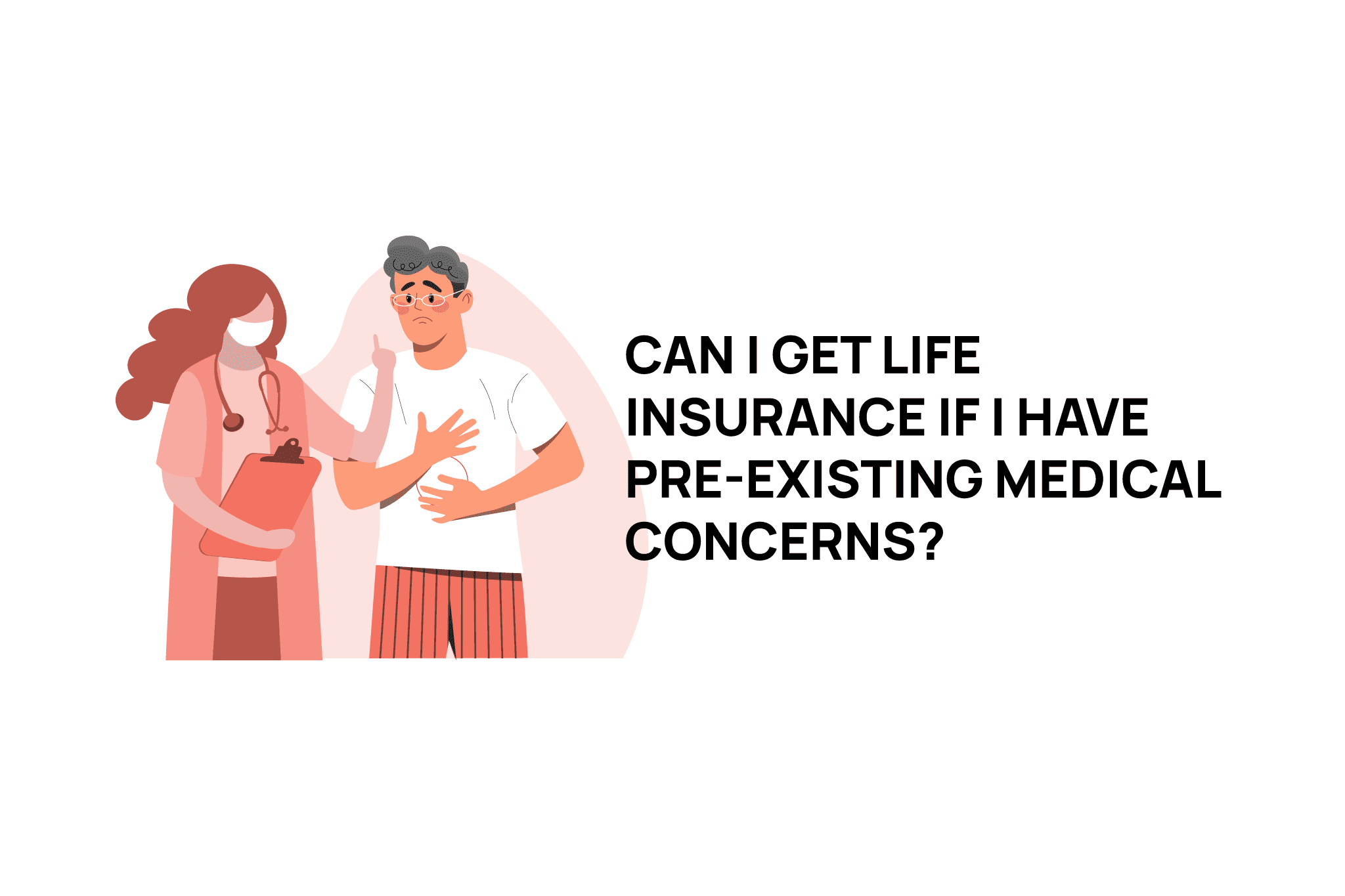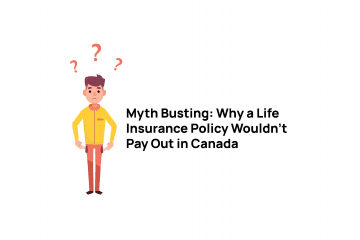I cannot begin to tell you how many times I have heard this over the years. People who have had health issues in their past joking that no insurance company would want them or that they couldn’t afford it if it was offered so they simply never bother applying for life insurance. The thing is though, most people don’t understand that the life insurance industry has a huge variety of policies and there is a solution for everyone, you just need to know where to look and what you’re looking for. With that in mind, let’s look at how to take your tricky health history and apply for life insurance.
In This Article:
- What is a Pre-existing Medical Condition?
- What could disqualify me from getting coverage?
- What Should I do if I have a Pre-existing Condition?
- How to Buy Life Insurance with a Pre-existing Condition?
- You Can Still Get Life Insurance Even With Pre-existing Medical Conditions!
What is a Pre-existing Medical Condition?
Simply put, in the eyes of a life insurance company a pre-existing medical condition is any medical issue that you began experiencing before you applied for your policy. It’s pretty self-explanatory with the name. The trick is that even if you haven’t been diagnosed with something, but you’ve been experiencing symptoms, that still counts. One of the questions they ask on the application is if you have had any medical tests that you haven’t received results from yet or if you have any scheduled tests coming up. If this is the case they are going to want to wait on their decision until after your test is done. Why does this matter? Life insurance is a one way contract. What this means is that once the policy is in place, assuming you were truthful on the application, as long as you pay the premiums the insurer cannot alter the terms of the contract. The insurer has the right during the application process to complete any investigation they would like to, and based on what they discover they determine what the premium they would require to accept the risk of the policy. If you agree to pay that premium the insurer is now tied into that contract for the duration. As long as the premium is paid they can’t change it. The owner can request a change (think of someone who quits smoking as an example) but the insurer can’t penalize you if you develop a medical condition in the future.
If you have a pre-existing condition it actually can work in your favour if you’ve had it for a longer period of time. Many chronic conditions such as hypertension or high cholesterol have undergone many medical advancements over the years. Why does this matter? Again, from the perspective of the insurance company, an applicant who has been diagnosed with high blood pressure (for example) and has had it controlled and stable with a prescription is a far better situation for an insurance company than in the past where these problems often went unmonitored and uncontrolled. The development of treatment plans for long term chronic medical conditions actually helps increase your life expectancy and a controlled health problem is far better in the eyes of the insurer.

What could disqualify me from getting coverage?
While most medical conditions are acceptable on some level for insurers there are a few things out there that make getting traditionally underwritten policies difficult. This would include:
- Heart Disease
- Kidney Disease
- Recent Cancer Diagnosis or treatment
- Substance abuse issues (excessive alcohol and or illegal narcotics)
While this isn’t a complete list it is worth noting that many of these conditions would result in you getting turned down for an underwritten policy. You may still be able to qualify for a guaranteed issue policy, but remember these usually carry high premiums with them and have a two year waiting period before any death benefit is payable.
Get a free quote
What Should I do if I have a Pre-existing Condition?
I get it, the idea that having something in your medical history that could result in you needing to pay higher premiums is not a nice thought to have. No one likes the idea that an insurance company is going to think that they are a higher than usual risk, or potentially a risk that they won’t even take on. If it’s something that you feel is minor in your health history the thought to not disclose it could pop into your mind. Simply said, do not do this. You need to be completely honest on your insurance application. This means that if you have an issue that you are aware of you need to disclose it, even if you feel like it is minor and that it’s ‘under control’. Your application to the insurance company needs to be truthful,if it isn’t then the insurer could consider that there was fraud committed and at the time of claim it could be denied. Don’t make this a possibility. As I mentioned earlier, if you are honest on the application and the insurer agrees to take on the risk then they will pay your beneficiaries because they were fully aware of your health before agreeing to issue the policy.
It is also possible that the ‘pre-existing condition’ is something that you can alter with your lifestyle. Were you aware of the fact that Health Canada has published ‘How Healthy are Canadians’, a study that estimates that as many as 4 out of 5 Canadians have some sort of risk factor for a chronic disease in their life that they could control with things like improving their diet, increasing exercise or reducing alcohol consumption? You can see the information here: https://www.canada.ca/en/public-health/services/publications/healthy-living/how-healthy-canadians.html#s3-2-1. Now think of this from the perspective of an insurance company who issued a life insurance policy for you. If they accept you at a higher than normal premium based on something within your control you are fully capable of changing your lifestyle and having that premium lowered as a result of the change. Your insurance company wants you to become healthier, this is simple, a healthier you pays premiums for longer. Of course they want that. You will need to show a commitment to the change in your lifestyle, for example, quitting smoking will have a requirement for a time frame of at least 12 months without any tobacco use, but you can apply to have your rates reduced if you make a lifestyle change that improves your health.

How to Buy Life Insurance with a Pre-existing Condition?
Even with a pre-existing condition you are likely still going to be able to find life insurance. There are a few things that you can do to help:
- Buy Now! This seems like it’s counterintuitive, but bear with me for the reason. If you have a chronic condition like high blood pressure that is well controlled you will likely be able to get insurance. If you wait and more problems that are related to hypertension develop your application becomes more difficult. You also need to recognize that life insurance is one product where it is unlikely that it will be cheaper in the future for you. The age when you apply is a key factor. If you delay the application because you’re hoping to make changes in your lifestyle that will improve your health, the premium you save could be offset simply by the fact that you are that older when you apply.
- Shop Around. This is something that few people think of when they apply for life insurance, but different insurers have different tolerances for pre-existing health conditions. Using a brokerage like https://lifeinsurancecanada.com/ provides you with a service where you can compare quotes from a number of different carriers and see which one has the most favourable underwriting for your particular pre-existing condition.
- Look into your benefit plan at work. Workplace benefit plans typically have an amount of life insurance that you get as a plan member. This could be equal to one times your annual earnings as an example. Most plans allow you to buy extra coverage as well and will contain a figure called the ‘non-evidence maximum’ (NEM). The NEM is now much coverage you can get without the insurer asking any health questions. If that NEM is higher than the amount you get for simply being a plan member check with your plan administrator and see if the plan allows you to buy more coverage. This isn’t a permanent option (reduces by 50% at age 65 and drops fully at age 71) and is tied to the plan your employer offers, but as long as it is available it is an option if you’re having a hard time with traditional underwritten policies.
- As a final option non-medical policies are available. These tend to be a last resort option for people because they usually come with high premiums and some additional clauses (remember earlier when I mentioned the two year wait period before the death benefit pays out) but there typically are no questions about your medical history. This means that any pre-existing conditions won’t factor into the premium.
You Can Still Get Life Insurance Even With Pre-existing Medical Conditions!
Even if your medical history isn’t pristine you can still get life insurance. Most insurers have a list of pre-existing conditions that they are willing to accept. Remember that in order to make sure that you get the best coverage and premium combination, take advantage of your ability to shop around. It can only help you.




